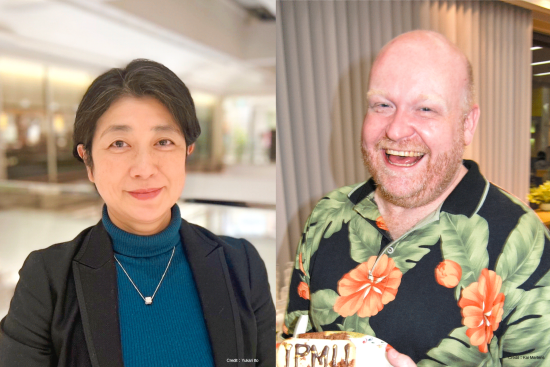April 1, 2025
Kavli Institute for the Physics and Mathematics of the Universe (Kavli IPMU, WPI)

The University of Tokyo Kavli Institute for the Physics and Mathematics of the Universe (Kavli IPMU, WPI) Professors Yukari Ito and Mark Vagins have been appointed as the institute’s newest Deputy Directors, beginning on April 1.
Ito and Vagins are taking on the role after Project Professor Tomiyoshi Haruyama and Professor Hiromi Yokoyama stepped down from their roles as Deputy Director on March 31.
Yukari Ito’s field of expertise is algebraic geometry, with a particular interest in complex 3-dimensional singularities and resolution of singularities. When a sheet of paper is folded, it produces sharp points in certain places. These are singular points. Ito’s research is thinking about how to eliminate these singular points. When there is a connection between a finite group that made the singularity, it is called a McKay correspondence. Ito has been studying these McKay correspondences in 3 dimensions, and has been exploring ways to construct higher dimensional McKay correspondences. Besides algebraic geometry, Ito has been researching representation theory in high dimensions. She works closely with physicists who use singularities to study black holes and the Big Bang, and singularities associated with string theory, especially as three dimensional Calabi-Yau manifolds. Ito is a member of the Science Council of Japan, and has been involved with support activities for researchers, and she is also a member of the Women in Science and Engineering (WISE) committee under The Association of Academies and Societies of Sciences in Asia. Last December she was elected as the next president of the Asian-Oceanian Women in Mathematics, which she will begin in August this year. Ito has also written several general public books and often talks about her research and field to the public.
Mark Vagins is an experimental physicist studying neutrinos; he has been involved with the Super-Kamiokande (SK) experiment since 1994, as well as various other Japan-based neutrino projects (K2K, T2K, and Hyper-Kamiokande). While Vagins was serving as one of the leaders of SK's solar and supernova neutrino physics group, in 2003 he and his American collaborator John Beacom, a theorist, conceived of a project to add tons of water-soluble gadolinium (Gd) salt into the SK water tank in order to greatly enhance the detector’s sensitivity. They named this bold plan GADZOOKS!: Gadolinium Antineutrino Detector Zealously Outperforming Old Kamiokande, Super! After several years of Gd feasibility studies - both experimental and theoretical - in 2009 a 200-ton testbed/pathfinder detector called EGADS: Evaluating Gadolinium’s Action on Detector Systems, was built in the Kamioka mine next to SK by IPMU and ICRR working under Vagins's direction. The purpose of EGADS was to conclusively establish that adding Gd to SK would be both safe and effective. Ultimately it would take nearly two decades’ worth of effort to demonstrate the true potential of gadolinium, but in 2020 SK's 50,000 tons of ultrapure water was finally enriched with gadolinium. Now, researchers are eagerly awaiting the world's first observation of the diffuse supernova neutrino background flux. Vagins was the first full-time non-Japanese professor at Kavli IPMU, and as one of the Institute's senior experimentalists he has continued to support and drive research at the institute.
Ito and Vagins will use their experience as researchers to guide their activities as new Deputy Directors of Kavli IPMU.
Related articles
Kavli IPMU Directory & Deputy Directors






